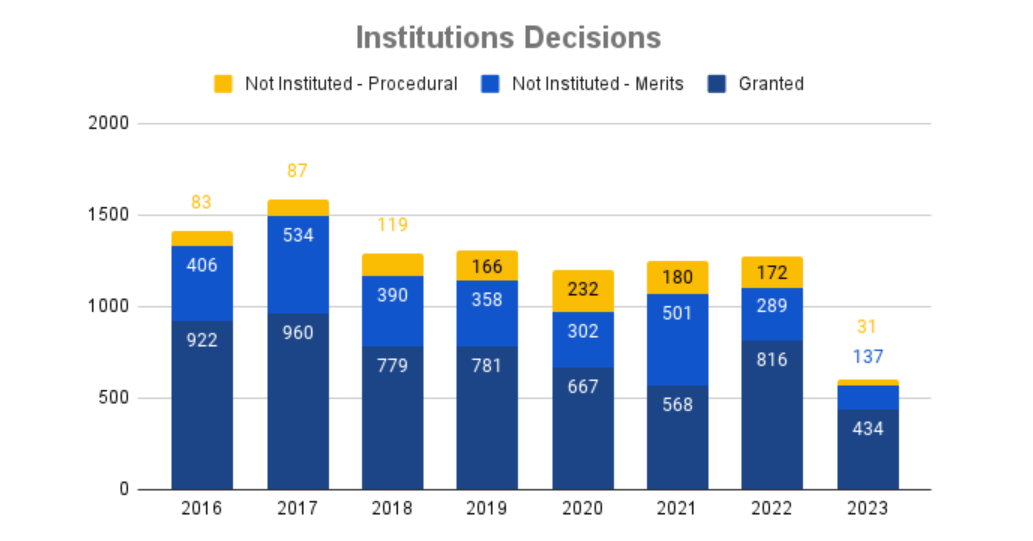While the PTAB saw a temporary reprieve from NHK Spring/Fintiv (“Fintiv”), it seems to be making a comeback, despite its ongoing challenges in Federal Court. Recall that parties have challenged Fintiv facially in District Court on the three grounds: 1) that in enacting Fintiv the PTO Director acted contrary to the patent statute, that 2) Fintiv is arbitrary and capricious, and that 3) the Fintiv instructions were issued without notice-and-comment rulemaking. The Federal Circuit has sent that challenge back to the district court to proceed.
Not satisfied to wait for that challenge to proceed, the USPTO issued a controversial Advance Notice of Proposed Rulemaking (“ANPRM”), proposing further changes. That has been met with overwhelming public opposition, generating almost 15,000 almost entirely negative comments.
In the meantime, half of all filed challenges continue to be forced to brief the issue in some fashion. Actual denials, despite that mountain of analysis, became rare, but the Board has begun to again deny petitions on the challenged rules.
For instance, the agency recently issued three new Finitv denials, suggesting the continued confusion around the policies. The first, issued on May 4, 2023 (here), Samsung Electronics Co. Ltd. v. California Institute of Tech., IPR2023-00130, Paper 10 (May 4, 2023), was followed by the second, issued the very next day. Roku, Inc. v. IOENGINE, LLC, IPR2022-01554, Paper 11 (May 5, 2023). The third issued earlier this month on July 17, 2023 (here), Vector Flow, Inc. v. HID Global Corporation, IPR 2023-00353, Paper 8.
The first case is interesting, given the high damages award, now reversed and remanded, against an earlier defendant, and that the challenge was denied despite the second filing defendant was not sued until far after. The second, a case with a parallel unstayed district court case before Judge Albright in Waco, shows that the agency may deny even where the party has stipulated to give away rights, as long as that stipulation isn't clearly commensurate with the stipulations filed in Sotera. Finally, in the third case, the Board denied the petitioner the opportunity to file a preliminary reply, showing that there is risk in not dedicating petition space to Fintiv issues. The Board also departed from the Director’s guidance regarding median trial times in light of the patent owner’s arguments presenting Lex Machina statistics regarding an individual judge’s patent case load relative to the rest of the district. This flipped the second Fintiv factor, as the median trial time would have placed trial after the final written decision deadline.
Perhaps most notable, however, is the fact that, more than five years after the original denial in Fintiv itself, a trial did finally materialize on the unreviewed patents–-and Judge Albright himself stopped mid-trial and ruled on summary judgment of noninfringement, suggesting that even the original bases for the practices were flawed from the jump.
Overall, grants of procedural denials are down to 31 for 2023.
While 325(d) denials account for 42% of procedural denials and 314(a) accounted for 49% in 2022, that gap has now grown to 58% for 314(a) denials and 42% for 325(d) denials.
As with the previous years, 314(a) and 325(d) still continue to dominate Procedural Denials in terms of the overage usage of them by the PTO.
Looking quarter by quarter, 314(a) was used 11 times quarter and 7 in Q1 of 2023.
Fintiv has been used 8 times already this year, with Parallel Petition denials used 6 times, and Joinder Denials being used 3 times.
Overall 314(a) denials still account for 12% of all denials.
325(d) denials account for 6.6%.







